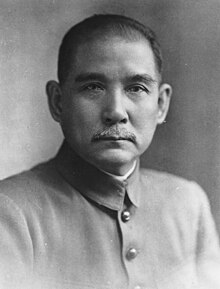
Back Sun Yat-sen Afrikaans Sun Yat-sen ALS ሱን ያት ሰን Amharic Sun Yat-sen AN سون يات سين Arabic سون يات سين ARZ Sun Yat-sen AST Sun Yat-sen Aymara Sun Yatsen Azerbaijani سون یات سن AZB
Father of the Nation Sun Yat-sen | |||||||||||||||||||||||||||||
|---|---|---|---|---|---|---|---|---|---|---|---|---|---|---|---|---|---|---|---|---|---|---|---|---|---|---|---|---|---|
孫中山 | |||||||||||||||||||||||||||||
 Sun in the 1910s | |||||||||||||||||||||||||||||
| 1st Provisional President of the Republic of China | |||||||||||||||||||||||||||||
| In office 1 January 1912 – 10 March 1912 | |||||||||||||||||||||||||||||
| Vice President | Li Yuanhong | ||||||||||||||||||||||||||||
| Preceded by | Office established | ||||||||||||||||||||||||||||
| Succeeded by | Yuan Shikai | ||||||||||||||||||||||||||||
| Premier of the Kuomintang | |||||||||||||||||||||||||||||
| In office 10 October 1919 – 12 March 1925 | |||||||||||||||||||||||||||||
| Preceded by | Office established | ||||||||||||||||||||||||||||
| Succeeded by | Zhang Renjie (as Chairman) | ||||||||||||||||||||||||||||
| Personal details | |||||||||||||||||||||||||||||
| Born | Sun Te-ming (孫德明) 12 November 1866 Cuiheng, Guangdong, Qing dynasty | ||||||||||||||||||||||||||||
| Died | 12 March 1925 (aged 58) Peking Union Medical College Hospital, Beijing, Republic of China | ||||||||||||||||||||||||||||
| Resting place | Sun Yat-sen Mausoleum | ||||||||||||||||||||||||||||
| Political party | Kuomintang | ||||||||||||||||||||||||||||
| Other political affiliations | |||||||||||||||||||||||||||||
| Spouses | |||||||||||||||||||||||||||||
| Children | 4, including Sun Fo | ||||||||||||||||||||||||||||
| Parents |
| ||||||||||||||||||||||||||||
| Education | Hong Kong College of Medicine for Chinese (MD) | ||||||||||||||||||||||||||||
| Occupation | Politician, writer, physician | ||||||||||||||||||||||||||||
| Signature (Chinese) |  | ||||||||||||||||||||||||||||
| Signature | |||||||||||||||||||||||||||||
| Military service | |||||||||||||||||||||||||||||
| Branch/service | Republic of China Army | ||||||||||||||||||||||||||||
| Years of service | 1917–1925 | ||||||||||||||||||||||||||||
| Rank | Grand marshal | ||||||||||||||||||||||||||||
| Battles/wars | |||||||||||||||||||||||||||||
| Common name in English | |||||||||||||||||||||||||||||
| Traditional Chinese | 孫逸仙 | ||||||||||||||||||||||||||||
| Simplified Chinese | 孙逸仙 | ||||||||||||||||||||||||||||
| Hanyu Pinyin | Sūn Yìxiān | ||||||||||||||||||||||||||||
| Jyutping | Syun1 Jat6-sin1 | ||||||||||||||||||||||||||||
| |||||||||||||||||||||||||||||
| Common name in Chinese | |||||||||||||||||||||||||||||
| Traditional Chinese | 孫中山 | ||||||||||||||||||||||||||||
| Simplified Chinese | 孙中山 | ||||||||||||||||||||||||||||
| Hanyu Pinyin | Sūn Zhōngshān | ||||||||||||||||||||||||||||
| Jyutping | Syun1 Zung1-saan1 | ||||||||||||||||||||||||||||
| |||||||||||||||||||||||||||||
| Courtesy name | |||||||||||||||||||||||||||||
| Traditional Chinese | 孫載之 | ||||||||||||||||||||||||||||
| Simplified Chinese | 孙载之 | ||||||||||||||||||||||||||||
| Hanyu Pinyin | Sūn Zàizhī | ||||||||||||||||||||||||||||
| Jyutping | Syun1 Zoi3-zi1 | ||||||||||||||||||||||||||||
| |||||||||||||||||||||||||||||
| Part of the Politics series |
| Republicanism |
|---|
|
|
Sun Yat-sen (/ˈsʊnˈjɑːtˈsɛn/;[1] traditional Chinese: 孫逸仙; simplified Chinese: 孙逸仙; pinyin: Sūn Yìxiān; 12 November 1866 – 12 March 1925)[2][3][a] was a Chinese revolutionary, statesman, and political philosopher who served as the provisional first president of the Republic of China and the first leader of the Kuomintang (KMT). Uniquely among 20th-century Chinese leaders, Sun is revered by both the Republic of China on Taiwan (where he is officially the "Father of the Nation") and by the People's Republic of China (where he is officially the "Forerunner of the Revolution") for his instrumental role in the 1911 Revolution that successfully overthrew the Qing dynasty.[4]
Educated overseas, Sun is considered one of the most important leaders of modern China, but his political life featured constant struggles and frequent periods of exile. After the success of the 1911 Revolution, Sun quickly resigned as president of the nascent Republic of China, relinquishing the position to the general Yuan Shikai and ultimately going into exile in Japan. He later returned to found a revolutionary government in Southern China to challenge the warlords who controlled much of the country following Yuan's death. In 1923, Sun invited representatives of the Communist International to Guangzhou to reorganize the KMT, resulting in the brittle First United Front with the Chinese Communist Party (CCP). He did not live to see his party unify the country under his successor, Chiang Kai-shek, in the Northern Expedition. Then residing in Beijing, Sun died of gallbladder cancer in 1925.
A vital component of Sun's legacy is his political philosophy, known as the Three Principles of the People: the peoples' independence from foreign domination, their rights, and their livelihood.[5][6][7] He also composed the lyrics to the National Anthem of the Republic of China.
- ^
- "Sun Yat-sen". Collins English Dictionary. 2020.
- "Sun Yat-sen". Dictionary.com. 2023.
- ^ Singtao daily. Saturday edition. 23 October 2010. 特別策劃 section A18. Sun Yat-sen Xinhai revolution 100th anniversary edition 民國之父.
- ^ "Chronology of Dr. Sun Yat-sen". Taipei: [[Sun Yat-sen Memorial Hall (Taipei)|]]. Archived from the original on 16 April 2014. Retrieved 12 March 2014.
- ^ Cite error: The named reference
Tung1was invoked but never defined (see the help page). - ^ "Three Principles of the People". Encyclopædia Britannica.
- ^ Schoppa, R. Keith (2000). The Columbia Guide to Modern Chinese History. Columbia University Press. pp. 73, 165, 186. ISBN 978-0-231-50037-1.
- ^ Sun, Yat-sen (3 August 1924). 三民主義:民生主義 第一講 [Three Principles of the People: People's living, Lecture 1]. 國父全集 [Complete collection of the National Father's scripts] (in Chinese). pp. 129–145. Archived from the original on 11 May 2019. Retrieved 30 December 2019 – via 中山學術資料庫系統. 我們國民黨提倡民生主義,已經有了二十多年,不講社會主義,祇講民生主義。社會主義和民生主義的範圍是甚麼關係呢?近來美國有一位馬克思的信徒威廉氏,深究馬克思的主義,見得自己同門互相紛爭,一定是馬克思學說還有不充分的地方,所以他便發表意見,說馬克思以物質為歷史的重心是不對的,社會問題才是歷史的重心;而社會問題中又以生存為重心,那才是合理。民生問題就是生存問題...
Cite error: There are <ref group=lower-alpha> tags or {{efn}} templates on this page, but the references will not show without a {{reflist|group=lower-alpha}} template or {{notelist}} template (see the help page).